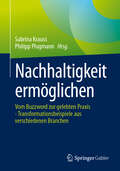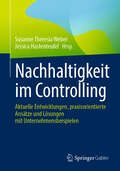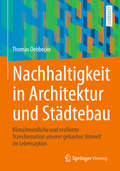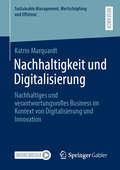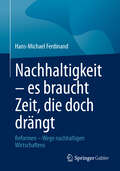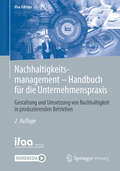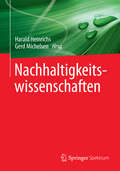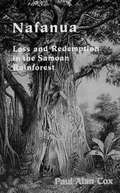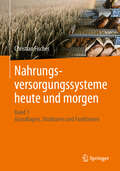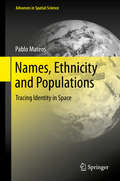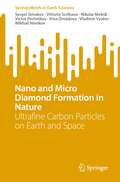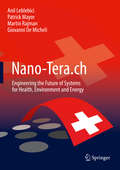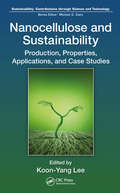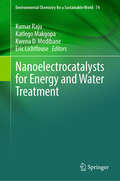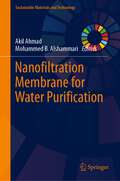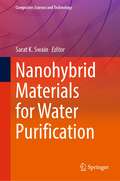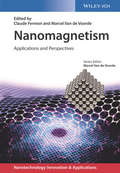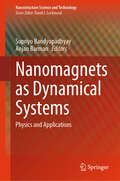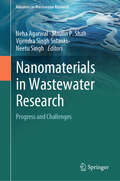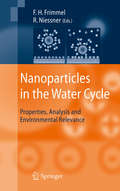- Table View
- List View
Nachhaltigkeit ermöglichen: Vom Buzzword zur gelebten Praxis - Transformationsbeispiele aus verschiedenen Branchen
by Philipp Plugmann Sabrina KraussNachhaltigkeit ist ein Buzzword geworden. Ursprünglich eine ökologische Sichtweise umfassend, hat der Begriff inzwischen in nahezu alle Wissenschafts- und Lebensbereiche Einzug gehalten: er ist zu einem Containerbegriff geworden. Was genau jedoch ist dann jeweils mit Nachhaltigkeit gemeint? Und wie ermöglichen wir diese? Die Beiträge in diesem Buch zeigen die verschiedenen Facetten und Bedeutungen von Nachhaltigkeit in den unterschiedlichen Disziplinen auf und versuchen die Annäherung an eine gemeinsame Kernbedeutung. Zudem legen sie die jeweiligen Möglichkeiten des Handelns dar und motivieren den Leser, sich dem Thema Nachhaltigkeit in seiner Vielfalt zuzuwenden und sinnvolle Maßnahmen umzusetzen. Die Leitidee ist, dass seitens der Kunden, Mitarbeiter und der Arbeitsprozesse Nachhaltigkeit sichtbar gemacht und gelebt werden muss. Dazu müssen in jeder Branche und in allen Lebensbereichen entsprechende Maßnahmen identifiziert und implementiert werden, um Innovationen zu unterstützen und voranzutreiben. Beispiele und Inspirationen dazu finden Sie in diesem Buch!
Nachhaltigkeit im Controlling: Aktuelle Entwicklungen, praxisorientierte Ansätze und Lösungen mit Unternehmensbeispielen
by Susanne Theresia Weber Jessica HastenteufelDie Beiträge dieses Praktikerbuchs erläutern die Potenziale und Herausforderungen der Nachhaltigkeit für das Controlling anhand von Fallstudien und/oder von in der Praxis erprobten Ansätzen und Lösungen. Sie richten sich primär an Controller*innen und Personen im Management, die Nachhaltigkeitscontrolling zur Optimierung des Unternehmenserfolgs einsetzen möchten, entweder aus der Perspektive des gesamten Unternehmens oder aus der Perspektive spezifischer Abteilungen und Prozesse. Die verschiedenen Beiträge beleuchten den in der Praxis nicht immer einfachen Prozess der Implementierung nachhaltiger Lösungen und unterstützen Unternehmen dabei, das Controlling und Reporting ihrer Nachhaltigkeitsstrategien erfolgreich umzusetzen. Dieser Sammelband stellt den dritten Teil zu wesentlichen Themen im Controlling dar. Das erste Werk „Branchenspezifisches Controlling“ bezieht sich auf bedeutsame Entwicklungen im Controlling in unterschiedlichen Branchen. Das zweite Buch „Digitale Transformation im Controlling“ präsentiert relevante Trends zur Digitalisierung im Controlling. Das vorliegende dritte Werk beschäftigt sich als logische Fortsetzung mit dem aktuellen Thema der Nachhaltigkeit aus der Controlling-Perspektive.
Nachhaltigkeit in Architektur und Städtebau: Klimafreundliche und resiliente Transformation unserer gebauten Umwelt im Lebenszyklus
by Thomas OebbeckeKlimawandel und Bauwirtschaft: Herausforderungen und Lösungen für eine resiliente Zukunft der gebauten Umwelt Welche Auswirkungen hat der Klimawandel auf Bau- und Wohnprojekte in urbanen Räumen, und wie können Städte und Gemeinden angemessen darauf reagieren? Der Architekt und Nachhaltigkeitsexperte Thomas Oebbecke beleuchtet die Risiken, die der Klimawandel für die gebaute Umwelt mit sich bringt, und zeigt – inspiriert von der Baugeschichte – auf, wie Städte im Zeitalter des Klimawandels unter den sich gravierend verändernden Klima- und Wetter Bedingungen widerstandsfähig und nachhaltig gestaltet werden können. Seine Empfehlungen richten sich an Architekten, Bauherren und Stadtplaner, aber insbesondere an Studierende der Bau- und Immobilienwirtschaft. Sie sind in ihrer Rolle als künftige Wirtschaftskapitäne und Fachkräfte eine zentrale treibende Kraft, um eine kritische Masse für die notwendige Transformation der Gesellschaft zu schaffen – mit einem besonderen Fokus auf die Bau- und Immobilienwirtschaft. Oebbecke bietet einen umfassenden Überblick über die klimatischen Veränderungen, deren Hintergründe und Wechsel- und Auswirkungen auf die Veränderung der globalen Lebensräume, sowie deren weitreichende Konsequenzen für die gebaute Umwelt ganz konkret hier in Europa und Deutschland. Dabei zeigt er nicht nur die Herausforderungen auf, sondern liefert zugleich praxisnahe Ansätze, relevante Nachhaltigkeitsmodelle als Lösungsstrategien und deren Weiterentwicklung, darunter das Triebkräftemodell von „Nachhaltigkeit 4.0“, sein Konzept sein „Sustainable Home“ und die von ihm entwickelten „12 Thesen“ und innovative Strategien, um eine nachhaltige und widerstandsfähige gebaute Umwelt zu gestalten. Seine Handlungsstrategien und Modelle sind ein Leitfaden für alle, die die gebaute Umwelt als Schlüssel zur Bewältigung des Klimawandels verstehen und aktiv mitgestalten wollen.
Nachhaltigkeit in der Gesamtbanksteuerung (Business, Economics, and Law)
by Kevin SchönbeinMit dem europäischen Green Deal stellt die EU-Kommission eine Antwort auf die vom Klimawandel ausgehende Gefahr für die Menschheit und die Ökosysteme der Erde vor. Es handelt sich um eine neue Wachstumsstrategie, die zur Umsetzung der Nachhaltigkeitsziele der Vereinten Nationen sowie des Pariser Klimaschutzabkommens beiträgt. Aktuelle wissenschaftliche Erkenntnisse zeigen, dass bereits Temperaturveränderungen von 1,5 Grad Celsius das Potenzial haben, gravierende negative Auswirkungen unter anderem auf die globale Wirtschaftsleistung zu entfalten. Vor diesem Hintergrund ist es für Kreditinstitute erforderlich, Klimarisiken auf geeignete Art und Weise in der Gesamtbanksteuerung zu berücksichtigen. In der vorliegenden Arbeit werden daher verschiedene Instrumente zur Risikoanalyse und Risikosteuerung von Klimarisiken vorgestellt, kritisch analysiert und deren methodische Grenzen aufgezeigt.
Nachhaltigkeit und Digitalisierung: Nachhaltiges und verantwortungsvolles Business im Kontext von Digitalisierung und Innovation (Sustainable Management, Wertschöpfung und Effizienz)
by Katrin MarquardtKatrin Marquardt leistet mit diesem Buch einen Beitrag zur Vertiefung des theoretischen und praktischen Wissens in den Themengebieten Nachhaltigkeit und soziale Verantwortlichkeit, zu Programmen und Initiativen zur Förderung der Nachhaltigkeit und zur Digitalisierung der europäischen Industrie, sowie zu Digitalisierung und Innovationen im Kontext von nachhaltigen und verantwortungsvollen Business.Im Rahmen der Forschung wurden klassische und digitale Geschäftsmodellen untersucht, die aktuellen ökonomischen, gesellschaftlichen und ökologischen Megatrends und das Wesen der Disruption analysiert, ein Modell für nachhaltige Servicequalität am Beispiel von Business Services und ein integratives Modell für nachhaltiges und verantwortungsvolles Business aufbauend auf Digitalisierung, Innovation und Qualität entwickelt. Katrin Marquardt ist aktuell als Projektmanager ein Horizont 2020 Projekt tätig. Ziel des Projektes ist es, das große Potenzial für kollektives Handeln und die Vernetzung von Einzelpersonen, Gruppen und Körperschaften von Landwirten und Landverwaltern freizusetzen, zu stärken und zu organisieren.Ihre Expertise als Projekt-, Transition- und Operation Manger eignete sie sich in verschiedenen international agierenden Unternehmen des Finanzwesens, der IT- und Telekommunikationswirtschaft und des Bildungswesens in Deutschland, Ungarn, Rumänien und England an.
Nachhaltigkeit – es braucht Zeit, die doch drängt: Reformen – Wege nachhaltigen Wirtschaftens
by Hans-Michael FerdinandUnternehmen stehen in einem Zwiespalt, wenn es um nachhaltiges Wirtschaften geht. Analysen zeigen, dass eine nachhaltige Entwicklung der Erde dringlich ist, eigentlich keinen Zeitaufschub zulässt. Sie ist eine moralische Verpflichtung, die freilich in der Geschichte, unter geschichtlichen Bedingungen umzusetzen ist, in denen Menschen ihre berechtigten, oft unterschiedlichen Interessen und Wertvorstellungen vorbringen und im Unternehmenshandeln umgesetzt sehen wollen. Wie Unternehmen mit dem gesellschaftlichen Dilemma umgehen, einerseits an der nachhaltigen Entwicklung des Planeten mitwirken zu sollen und andererseits zugleich die Interessen aller Stakeholder zu berücksichtigen, ist Gegenstand dieser Untersuchung. Zunächst wird ein globaler Status Quo in Sachen nachhaltiger Entwicklung der Erde erhoben. Grundlage dafür sind wissenschaftliche Analysen zu Erderwärmung und Klimawandel, sowie zu Verfügbarkeit und gerechter Verteilung von Ressourcen. Und obwohl deren Ergebnisse dringliches Handeln verlangen, zeigen sich in Politik und Ökonomie immer wieder Hemmschuhe der Transformation, die zu überwinden sind. Der eine nicht: Nachhaltiges Handeln kann – zumal in demokratischen Gesellschaften – nicht von wem und was auch immer „verordnet&“, sondern um der Menschen willen nur durch beständige Reformen umgesetzt werden. Die wirtschaftsphilosophischen Ansatzpunkte dafür liefert Immanuel Kant. Für das nachhaltige Wirtschaften von Unternehmen werden daraus Meilensteine möglicher unternehmensindividueller Reformwege zusammengestellt, vor allem aus den Bereichen Beteiligung von Stakeholdern, Kreislaufwirtschaft, Klimaneutralität und menschenrechtlicher Sorgfalt. Mit deren Hilfe soll dann eine wissenschaftlich fundierte, empirische Content-Analyse von Nachhaltigkeitsberichten zeigen, wie deutsche Unternehmen unterschiedlicher Größenordnungen und Branchen mit der Entwicklung und Optimierung nachhaltiger Erträge umgehen. Daraus ergibt sich ein Bild nachhaltigen Wirtschaftens in Unternehmen, dessen Status Quo im abschließenden Kapitel zusammengefasst wird.
Nachhaltigkeitsmanagement - Handbuch für die Unternehmenspraxis: Gestaltung und Umsetzung von Nachhaltigkeit in produzierenden Betrieben
by ifaa – Institut für angewandte Arbeitswissenschaft e. V.Das Handbuch vermittelt in kompakter Form die Grundlagen und ein praxisorientiertes Konzept zur erfolgreichen Einführung und Verbesserung eines Nachhaltigkeitsmanagements in Unternehmen. Es basiert auf einem ganzheitlichen Verständnis von Nachhaltigkeit, das neben wirtschaftlichen, umweltbezogenen und sozialen Aspekten auch technische Ziele berücksichtigt. Die Inhalte werden strukturiert, übersichtlich und anschaulich dargestellt. Das Handbuch enthält zudem zahlreiche Hinweise sowie praktische Arbeits- und Gestaltungshilfen für betriebliche Akteure.
Nachhaltigkeitswissenschaften
by Harald Heinrichs and Gerd MichelsenForscher und Dozenten der ersten deutschen Fakultät für Nachhaltigkeitswissenschaften an der Universität Lüneburg haben das Standardwerk zum Thema geschrieben. Sie schildern zunächst die naturwissenschaftlich-technischen Grundlagen, um anschließend die Perspektive der Akteure und integrierende Ansätze darzustellen. Zuletzt werden beispielhaft Problem- und Handlungsfelder wie Biodiversität und globale Gerechtigkeit aufgezeigt. Mit Infokästen, illustrativen Fallbeispielen sowie Hinweisen zu weiterführender Literatur und relevanten Institutionen.
Nafanua: Saving the Samoan Rain Forest
by Paul Alan CoxA moving and haunting memoir by one of the finest ethnobotanists working in the south Pacific, Nafanua is a story of triumph and tragedy that serves to remind us that all the rain forests of the world are rare natural treasures deserving of reverence and protection.
Nahrungsversorgungssysteme heute und morgen: Band 1 - Grundlagen, Strukturen und Funktionen
by Christian FischerWie lassen sich im Jahr 2050 etwa 10 Milliarden Menschen gesund ernähren und nachhaltig mit Nahrungsmittel versorgen? Dieses Buch behandelt in einfachen Worten aber mit der notwendigen inhaltlichen Tiefe einige der dringensten Probleme der Menschheit und diskutiert mögliche Lösungsansätze.Band 1 beschreibt die Grundlagen heutiger Nahrungsvorgungsketten und -systeme („Food Supply Chains and Systems“). Neben Fragen der Ressourcenverfügbarkeit werden alle Stufen der Nahrungsversorgungskette, das heißt die Landwirtschaft und Aquakultur, die Lebensmittelverarbeitung, der Lebensmittelhandel und der Verbrauch in Haushalten und außer Haus behandelt
Names, Ethnicity and Populations
by Pablo MateosEthnicity has become one of the most studied human dimensions in social and biomedical sciences over the past decade. However, there are important shortcomings in the means available to researchers to define and classify human group difference in past, as well as contemporary populations. Personal naming conventions usually adhere to unwritten social norms and customs that with time end up producing distinctive cultural, ethnic, linguistic, religious and geographic patterns in name distributions. This book follows the fascinating journey of personal names across the world, using maps and networks to identify alternative combinations of ethnic and geographic origins in contemporary population groups and neighbourhoods. This innovative approach allows population researchers to build more nuanced understandings about the history and immediate future of our contemporary multicultural societies, at a time in which the predominant political discourse and public debates are challenging increasing population diversity in the developed world.
Nano and Micro Diamond Formation in Nature: Ultrafine Carbon Particles on Earth and Space (SpringerBriefs in Earth Sciences)
by Sergei Simakov Vittorio Scribano Nikolai Melnik Victor Pechnikov Irina Drozdova Vladimir Vyalov Mikhail NovikovIn this book, readers will gain a deep understanding of the distinct characteristics and intricate formation mechanisms behind each type of diamond.A standout feature of this book is its in-depth exploration of nanodiamonds, shedding light on their unique formation processes. The narrative is thoughtfully organized, covering four main categories of natural diamonds and their related formation processes: 1)Interstellar nanodiamond particles; 2) Nano- and microcrustal diamonds associated with coals, sediments, and metamorphic rocks; 3) Nanodiamonds and microdiamonds associated with secondary alterations of mafic and ultramafic rocks mainly in the oceanic lithosphere; 4) Mantle-derived diamonds associated with kimberlites and their xenoliths, such as peridotites and eclogites.With clarity and precision, this book caters to both researchers and students in the fields of mineralogy and mineral formation. This book serves as an invaluable resource, offering an all-encompassing perspective on diamond formation, appealing to those curious minds eager to delve into the captivating realm of these precious gems.
Nano-Structured Photovoltaics: Solar Cells in the Nanotechnology Era
by Vinod Kumar KhannaPresenting a comprehensive overview of a rapidly burgeoning field blending solar cell technology with nanotechnology, the book covers topics such as solar cell basics, nanotechnology fundamentals, nanocrystalline silicon-based solar cells, nanotextured-surface solar cells, plasmon-enhanced solar cells, optically-improved nanoengineered solar cells, dye-sensitized solar cells, 2D perovskite and 2D/3D multidimensional perovskite solar cells, carbonaceous nanomaterial-based solar cells, quantum well solar cells, nanowire solar cells and quantum dot solar cells. The book provides an in-depth and lucid presentation of the subject matter in an elegant, easy-to-understand writing style, starting from basic knowledge through principles of operation and fabrication of devices to advanced research levels encompassing the recent breakthroughs and cutting-edge innovations. It will be useful for graduate and PhD students, scientists, and engineers.
Nano-Tera.ch: Engineering the Future of Systems for Health, Environment and Energy
by Anil Leblebici Patrick Mayor Martin Rajman Giovanni De MicheliThis book presents the overall vision and research outcomes of Nano-Tera.ch, which is a landmark Swiss federal program to advance engineering system and device technologies with applications to Health and the Environment, including smart Energy generation and consumption. The authors discuss this unprecedented nation-wide program, with a lifetime of almost 10 years and a public funding of more than 120 MCHF, which helped to position Switzerland at the forefront of the research on multi-scale engineering of complex systems and networks, and strongly impacted the Swiss landscape in Engineering Sciences.
Nano-biotechnology for Waste Water Treatment: Theory and Practices (Water Science and Technology Library #111)
by Jai Prakash Narain Rai Shweta SaraswatThis book embodies the potentials of nanobiotechnology-based water treatment techniques to provide a solid understanding of the subjects. Starting with a refresher of the basic conventional technologies which are now been integrated with nanomaterials for an efficient, viable, and eco-friendly treatment of contaminated water. The book covers various physical, chemical, and hybrid methods of nanobiomaterial synthesis and their fabrication for characterizing existing techniques. The book gives special attention to those nanotechnology-based approaches that promise easier, faster, and cheaper processes in contaminants monitoring and their treatment. Several case studies explain in an easy to understand format how employing nanobiomaterials as an indicator and analytical tool will enable students to learn about cleaning up the environment.
Nanocellulose and Sustainability: Production, Properties, Applications, and Case Studies (Sustainability: Contributions through Science and Technology)
by Koon-Yang LeeNanometre scale cellulose fibres, or nanocellulose, are emerging materials for various advanced applications. Nanocellulose and Sustainability: Production, Properties, Applications, and Case Studies provides a comprehensive overview of nanocellulose production, nanocellulose properties and nanocellulose in selected applications. This book serves as an entry level reference text for undergraduates, graduate students, researchers and professional engineers working in the area of nanocellulose and sustainability. Features: Summarises the surface and bulk properties of various types of nanocellulose Reviews the application of nanocellulose in water purification and optically transparent materials Provides an overview of nanocellulose as Pickering emulsifier, binder for loose natural fibres to produce non-woven preforms, as well as nanocellulose-based aerogels Presents a techno-economic analysis of industrial bacterial cellulose production Discusses the pilot scale production of cellulose nanocrystals
Nanoelectrocatalysts for Energy and Water Treatment (Environmental Chemistry for a Sustainable World #74)
by Eric Lichtfouse Kumar Raju Katlego Makgopa Kwena D. ModibaneNanomaterials have recently garnered significant attention and practical importance for heterogeneous electrocatalysis. This book presents recent developments in the design, synthesis, and characterisation of nanostructured electrocatalytic materials, with a focus on applications to energy and wastewater treatment. Electrocatalytic nanomaterials can enhance process efficiency and sustainability, thus providing innovative solutions for a wide array of areas such as sustainable energy production, conversion, and wastewater treatment. Readers will gain insights into the latest breakthroughs in electrocatalysis and the activity of nanomaterials in energy conversion applications, e.g., fuel cells, hydrogen production, water splitting, and electro/photocatalytic water splitting, as well as for wastewater treatment. The book explores the development of advanced electrocatalysts, particularly hybrid materials.
Nanoferroics
by A. V. Ragulya M. D. Glinchuk Vladimir A. StephanovichThis book covers the physical properties of nanosized ferroics, also called nanoferroics. Nanoferroics are an important class of ceramic materials that substitute conventional ceramic ferroics in modern electronic devices. They include ferroelectric, ferroelastic, magnetic and multiferroic nanostructured materials. The phase transitions and properties of these nanostructured ferroics are strongly affected by the geometric confinement originating from surfaces and interfaces. As a consequence, these materials exhibit a behavior different from the corresponding bulk crystalline, ceramic and powder ferroics. This monograph offers comprehensive coverage of size- and shape-dependent effects at the nanoscale; the specific properties that these materials have been shown to exhibit; the theoretical approaches that have been successful in describing the size-dependent effects observed experimentally; and the technological aspects of many chemical and physico-chemical nanofabrication methods relevant to making nanoferroic materials and composites. The book will be of interest to an audience of condensed matter physicists, material scientists and engineers, working on ferroic nanostructured materials, their fundamentals, fabrication and device applications.
Nanofiltration Membrane for Water Purification (Sustainable Materials and Technology)
by Akil Ahmad Mohammed B. AlshammariThis book covers the basic and sustainable approach of nanofiltration membrane techniques along with their fabrication, characterization, separation mechanisms, and broad applications in the field of wastewater treatment. It provides a wide knowledge of nanofiltration technique to water purification audience concerning the recent development with various illustrations, methods and results for graduate students, scientists, academicians, researchers, and industrialists. Readers from wastewater and water purification will have a quick reference by exploring the research literature on the subject field with commercial value-added research applications of nanofiltration membrane.
Nanohybrid Materials for Water Purification (Composites Science and Technology)
by Sarat K. SwainThis book comprehensively reviews the key topics in the area of nanocomposites and hybrid materials used for waste water treatment and purification. It covers materials chemistry, various synthesis approaches and properties of these nanomaterials for the different water purification techniques. It provides new direction to the readers to better understand the chemistry behind these materials and the methods to improve their properties. This book will be a very valuable reference source for graduates and postgraduates, engineers, research scholars (primarily in the field of material science, water, nanoscience and nanotechnology), material scientists, researchers in the water-related area, scientists working in water treatment plans and pollution mitigation industries.
Nanomagnetism: Applications and Perspectives
by Marcel Van de Voorde Claude FermonThis first book to focus on the applications of nanomagnetism presents those already realized while also suggesting bold ideas for further breakthroughs. The first part is devoted to the concept of spin electronics and its use for data storage and magnetic sensing, while the second part concentrates on magnetic nanoparticles and their use in industrial environment, biological and medical applications. The third, more prospective part goes on to describe emerging applications related to spin current creation and manipulation, dynamics, spin waves and binary logic based on nano-scale magnetism. With its unique choice of topics and authors, this will appeal to academic as well as corporate researchers in a wide range of disciplines from physics via materials science to engineering, chemistry and life science.
Nanomagnets as Dynamical Systems: Physics and Applications (Nanostructure Science and Technology)
by Supriyo Bandyopadhyay Anjan BarmanThis contributed volume provides a comprehensive overview of contemporary advancements in the field of nanomagnetism and spintronics. It covers a diverse range of topics, including the static and dynamic responses of designer nanomagnets, spin wave dynamics in ultra-thin ferromagnetic films, voltage-controlled magnetic anisotropy, magneto-elastic control of nanomagnet dynamics, mutual synchronization in spintronic oscillators, magnetic droplet solitons, and the applications of voltage-controlled magnetic anisotropy in spintronic devices. Each chapter discusses specific aspects of these subjects, exploring theoretical models, experimental methods, applications, and future directions, making it an essential resource for researchers, students, and professionals in the fields of physics, materials science, electrical engineering and nanonscience.
Nanomaterials and Nanoliquids: Applications in Energy and Environment (Advances in Sustainability Science and Technology)
by Dharmendra Tripathi Ravi Kumar Sharma Rajamohan Natarajan Hakan F. OztopThis book discusses recent work on the use of nanoparticles in energy and environment-related work. This book presents experimental, numerical, analytical, and theoretical work on the use of nanomaterials in energy and environment. This book helps to highlight cutting-edge research and is a ready reference for the researchers working in this arena of academia and industries. This book provides insights related to various forms of nanotechnological applications in green buildings, environmental and electrochemical, solar distillation systems, green energy, storage tank of the SWH system, solar concentrator system's receiver, and CFD simulations of various aspects of nanofluids/hybrid nanofluids, which are particularly useful, valuable for the betterment of society.
Nanomaterials in Wastewater Research: Progress and Challenges (Advances in Wastewater Research)
by Maulin P. Shah Neetu Singh Neha Agarwal Vijendra Singh SolankiThis book explores the perspectives and prospects of nanotechnology in environmental remediation and provides a deep insight into the role of nanomaterials for wastewater remediation. The book also focuses on the need for novel developments in the nanomaterials which can target particular contaminants in wastewater. It also takes into account the challenges involved in the application of these nanomaterials, their social and economic aspects, and future directions in multifaceted aspects of nanomaterial use that will facilitate future research to formulate the strategies for environmental restoration. Nanotechnology offers new and improved environmental remediation technologies such as nanophotocatalysts, nanosensors, nanodevices, nanofilters, and nanoadsorbents for the decontamination of toxic pollutants, groundwater, and industrial wastewater. Considering the capabilities of nanotechnology in controlling, eliminating, and purifying environmental pollutants, it can also be considered as a green technology and an effective tool to achieve sustainable environment.
Nanoparticles in the Water Cycle
by Fritz H. Frimmel R. NiessnerAs nanotechnology enters everyday life, engineered nanoparticles (ENP) will find their way into nature, including surface and groundwater. Here, distinguished experts of water chemistry present dedicated methods for the analysis of nanoparticles in the aquatic environment, their distribution and fate. This includes the influence of complex matrices such as wastewater, brown water with natural organic matter (NOM), and high salt concentrations as well as available and future standardized methods. The background of geogenic, natural nanoparticles is considered in a discussion of known environmental effects, including strategies to test for potential effects on human and environmental health.
